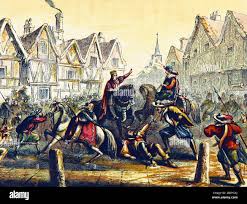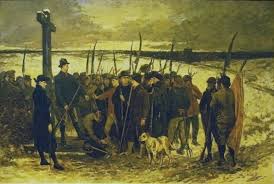Peasants Revolt, also called wat Tyler’s Rebellion, was the first and a Great Uprising of dissatisfied peasants and their supporters March In London, demanding that the king abolish the poll tax.
The uprising started as a resistance cause the people were angry about a series of issues, and they demanded that changes be made.

The rebellion gained more momentum and growth, and different factions and cliques were under the leadership of different individuals, namely; Wat Tyler, Jack Straw and John Ball.
John Ball, a radical preacher and leader of a faction of the peasants, heavily criticised the feudal system and the church itself. In his preachings, he opined that a class system should not organise the society because God saw everyone as equals and that the peasants were unfairly treated. His preachings eventually led to him being excommunicated in 1366.
The revolt, however, did not achieve all its aims, and on June 13, they broke into the city, burned the administrative documents, and released prisoners. King Richard took shelter at London Tower with his advisors and agreed to meet with peasants. They stated their demand to be free and move around the country and the release of certain advisors to be executed.
Shortly after the meeting, the peasants took over the Tower of London, where they murdered The Chancellor and Archbishop of Canterbury Simon Sudbury and also murdered the Lord Treasurer Robert Hales.

King Richard rode out to a meeting with the peasants at Mile Ends, where he offered them freedom and pardons for their involvement in the rebellion. The meeting went a long way toward expressing their dissatisfaction. In the next meeting with the peasants, there was tension and the leader Wat Tyler was injured. He managed to run away and was taken to the hospital; he was later dragged out of the hospital and taken back to Smithfield, where he was executed.
However, King Richard did not keep his promises as Serfdom wasn’t abolished. Instead, he sent soldiers to round up the rebels, and the revolutionary leaders were executed.
Although the revolt had failed to achieve its aims, it showed that the peasants could organise themselves, and it served as a warning to the future monarchs. Although Serfdom wasn’t abolished, rules on them had relaxed over some time, and the poll tax was not introduced again until 1990.





